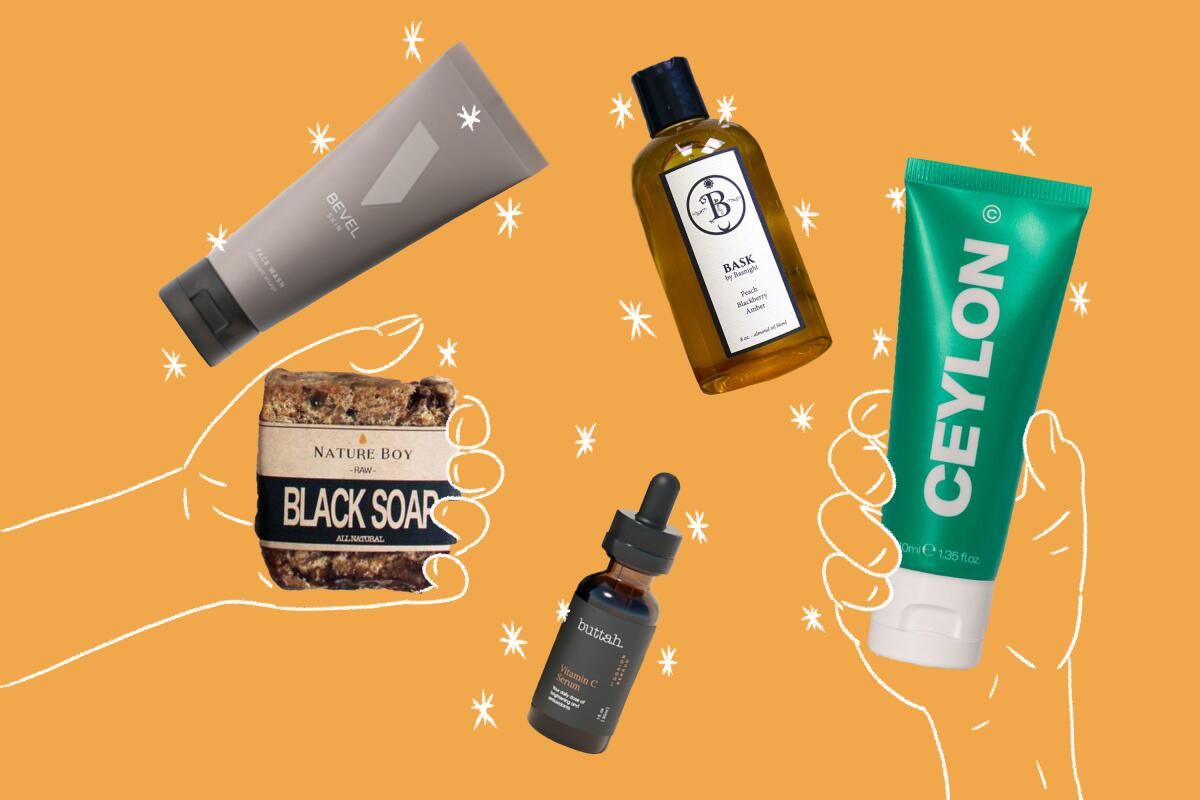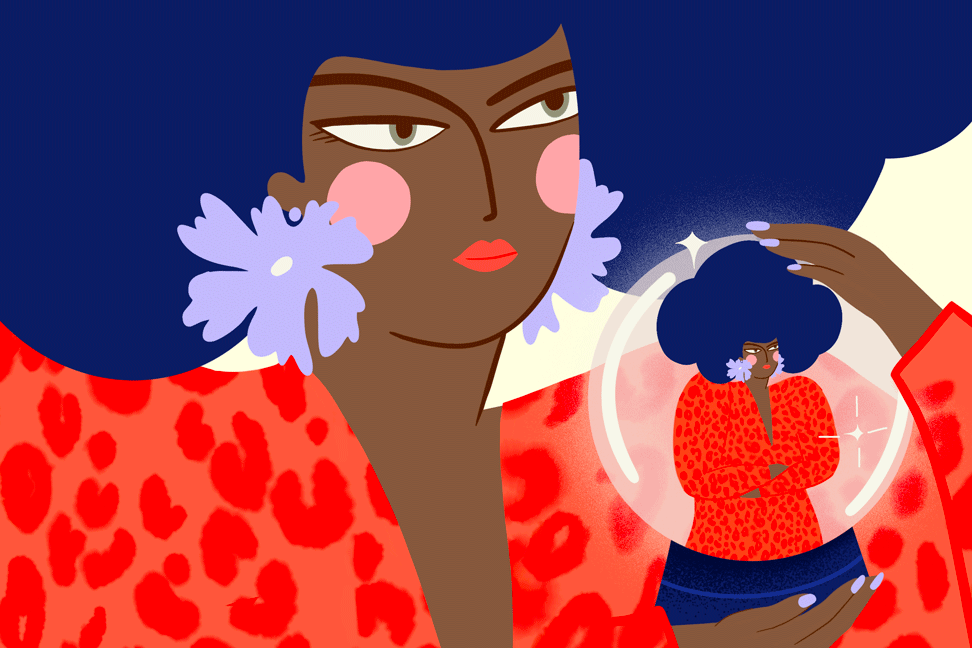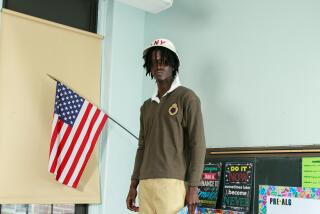Black men are ignored by the skin-care industry. These brands are stepping up

- Share via
For Dorion Renaud, founder of Buttah skin care, the mission and message of his brand goes beyond the bottle.
During his 20s, the L.A.-based entrepreneur and actor sought out products that would address the hyperpigmentation and scarring left from teenage acne. He turned up either empty handed or with items that failed to even out his melanin-rich skin tone.
“I had really messed-up skin growing up, and my acne, instead of healing, would turn into a dark spot,” Renaud said. “I couldn’t find a product that would address these issues and didn’t like the store experience of seeing an aisle labeled ‘urban’ or ‘ethnic’ or having to ask a store clerk to open up a case to get a product. I didn’t want to be categorized. We all have skin, so why do I have to feel categorized?”
Renaud had been on the hunt for skin-care products for years while working as a model and living in New York. It wasn’t until he purchased a block of pure shea butter from a street vendor in Harlem, which he would melt down in his microwave, that Renaud finally began to get the results he was seeking. Shea butter has traditionally been used to treat discoloration and stretch marks and to heal scars. The ingredient became the basis of Buttah.
In 2018 he launched his line of nine products, including CocoShea Cream, Vitamin C Serum and Charcoal Detox Mask, which are sold on the Buttah website and debut on QVC this month.
Renaud is among a growing list of founders creating skin-care and grooming brands made for men of color and primarily for Black men. Like Renaud, many of these founders have developed products out of personal necessity and to serve a sector of the market where skin issues such as hyperpigmentation and grooming challenges, including ingrown hairs, are prevalent but historically underserved across mass- and prestige-market products.
“Men of color have been largely ignored by the market, even with men’s skin care being valued at a $1-billion-plus industry by 2024,” said Patrick Boateng, founder of L.A.-based grooming brand Ceylon, citing a report released by Grand View Research, a market research and consulting company.
While living in China years ago, Boateng, a former U.S. diplomat, searched for a skin-care product that would address his skin breakouts and subsequent scarring. In the robust Asian beauty market, he couldn’t find anything that was made with varied skin tones in mind.
Ceylon was his self-generated solution designed to solve the issues that men of color disproportionately face such as acne scarring and razor bumps. The line has three products, which were developed with Dr. Lynn McKinley-Grant, president of the Skin of Color Society and a professor of dermatology at Howard University in Washington, D.C.
“This happened to me, and I know it’s happened to a lot of other guys like me,” said Boateng about the dearth of personal-care products for men of color. So he left his position at the State Department in 2017 to launch Ceylon. “Being in a very challenging personal situation led me to build something that would work for me and others with pigmented skin,” he said.
True inclusivity starts at the point of product development, Boateng said, but to date, product efficacy in dermatology has been validated through testing on white skin.
“Certain people are underrepresented in research,” said Dr. Jenna Lester, assistant director of the Skin of Color program at UC San Francisco’s department of dermatology. Lester started the Skin of Color program two years ago with a goal of improving the clinical care of patients of color and the education of the residents who train in the program as well as to address disparities in research.
She said ingrown hairs are one of the most common grooming challenges for Black men because it’s an issue specific to curly hair. “When a curly hair loses its way when growing back out of the skin and then goes back in, it creates inflammation and appears as a bump,” Lester said. “It’s been a big problem for many African American men because their hair is curly. In the armed services, some were dishonorably discharged because they couldn’t adhere to the grooming practices. Growing out the hair relieves the ingrown hairs. Otherwise, it can be painful, itchy and leave dark marks or keloids.”
As L.A. labels adapt, back-burnered projects and faraway trends come into focus — fast.
In 2013, technology executive Tristan Walker launched Bevel, a shaving system and grooming line made for sensitive skin and men of color. Products such as Bevel’s Safety Razor are designed for coarse and curly hair, to reduce the pull and tug on the skin and to help prevent razor bumps. Pair that with Bevel’s lifting and exfoliating shave brush, a calming priming oil and hydrating face balm. The brand has been built with the shaving needs of Black men as the central focus, and has expanded into hair care by making trimmers, beard oil and a beard softener for at-home hair trims and maintenance.
“We pick up where your barber left off,” states the hair product page on the Bevel website. However, as robust and successful as the Bevel brand is seven years after inception (the Atlanta-based brand, which sits under Walker’s Walker & Co. umbrella, was acquired by Procter & Gamble in 2018), the founder said that starting a personal-care company to serve the Black community was initially met with hesitation by potential investors.
“When I wanted to start Walker & Co., investors consistently told me that the market was too small, my audience too niche,” Walker said. “No one really took a pause to ask why the market was so small. Perhaps the market is so small because the products the large players make for us are ones that we can’t use. Sometimes market opportunities need to be created, and we did just that. This is why I keep speaking out on the need to have more people of color in positions of power at VC firms, in executive roles and in board seats. When your company reflects the diversity of your consumer base, you’re more likely to identify opportunities to serve them better, which leads to better business outcomes.”
Bevel has been instrumental in setting a path for entrepreneurs who have launched artisanal products and solutions made with Black men in mind.
Meet Christian Guernelli, the Culver City fashion designer, behind an all-digital model squad.
West Covina-based Nature Boy and Chicago-based Brands by Basnight make small-batch beard oils and grooming products and kits. Both were born out of what their respective founders felt was a lack of representation in the personal-care space and a desire to share their grooming practices with other Black men.
In 2014, Nature Boy’s founder, Jacob Quetant, needed a solution for his beard and couldn’t find anything in his local beauty supply stores. “I realized that my homemade oil serum could be of benefit to men like myself with coarse hair and no guidance on how to manage it,” he said. “I’ve had a growing desire to contribute to the representation of what it means to be a Black-owned business, and I felt I had the capability to do so by way of this passion of mine. Itchy skin beneath the beard, dry brittle beard hair, ingrown hairs, fairy knots [small knots in the beard hair], patchy, uneven growth zones, and the list goes on.”
Emanuel Basnight, founder of Brands by Basnight, incorporates ingredients such as shea butter, Jamaican black castor oil and avocado oil into his handmade and hand-packaged products. “I have a commitment to the physical and spiritual health of Black people,” said Basnight, a former marketing executive, about the purpose of his products. “I felt like I needed to speak out for a lot of men who didn’t have a product to fit their identity. I was using these beard products for myself but didn’t know if men would want to use a beard mask, a rinse and then an oil. But the response has been great.”
He cites Walker & Co. as an inspiration for his own growing empire. “Walker Brands is amazing,” Basnight said. “It was the first time I had seen a Black man create a brand geared toward the insight and customs of Black men.”
Basnight, who has studied permaculture farming, has his sights set on addressing supply-chain issues for medium-sized, self-funded brands like his. “It has been a barrier for Black business owners to access the supply chain,” said Basnight about getting raw ingredients he needs at an affordable price. “I want to do my part in creating a platform for agricultural resources to help more entrepreneurs get in the game.”
The commitment to create more representation and resources for Black men in personal care is what Renaud means by “beyond the bottle,” and it’s something he witnessed long before he started his own skin-care brand.
“My father was the first beauty entrepreneur in my life. He owned a barbershop and shoe shine where I worked the register since age 8,” Renaud said. “I saw how a haircut made people feel. Self-care is something you have to do whether you’re having a good day or a bad day, and I learned that from my dad. Self-care is generational, especially in the Black community.”
More to Read
Sign up for The Wild
We’ll help you find the best places to hike, bike and run, as well as the perfect silent spots for meditation and yoga.
You may occasionally receive promotional content from the Los Angeles Times.











